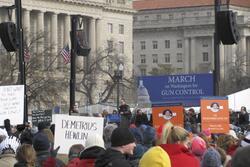Disarming Hate
At an international youth conference aimed at fostering Jewish community, I had an epiphany, but it wasn’t about Judaism. It was about guns.
The staff of the group, USY, had announced a new policy forbidding us from posting on social media when we were outside the convention hall in Orlando, FL. Organizers seemed apologetic, but they followed up with a warning: It wasn’t safe. They were afraid of what would happen if the wrong person knew the location of a bunch of Jewish teens. With antisemitism on the rise, we weren’t people; we were targets.
With that warning still fresh in my mind, the first teen speaker of the day took the stage. She was a student at Marjory Stoneman Douglas High School, and she made a speech about the trauma the shooting of last Valentine’s Day inflicted on her. As I listened to her, I was blown away by how similar we were, how the girl who feared for her life in her own high school could have easily been one of my peers, or myself. When she finished her speech, I thought about how sad it was that someone who had faced the horrors of gun violence had to fear that if she posted online, she could face the same kind of violent hate again.
I and many of my fellow USYers were shaken by the talks, but what came next was singular in its ability to bring an entire room to a place of raw emotion. The rabbi of one of the congregations that survived the Pittsburgh synagogue shooting began to speak. He spoke about the victims and each small, special quality that their community lost with them. He spoke about the trauma his family faced knowing that he could have been taken away from them as well. He spoke about how the centuries-old scourge of violent anti-semitism tore a hole in his congregation. As the voices of the rabbi and the Parkland student intertwined in my mind, I realized that I am not only a Jew, I am a Jewish teen, and that makes me just as likely to be shot in my school as I am to be shot in a temple. I leaned into the arms of my friend, and along with the rest of the room, I cried.
In considering the problem that is American gun violence, we cannot ignore the intersectionality at play. Just as I am at risk both by being a teen and by being Jewish, each person’s minority identity makes them more vulnerable. For example, the Center for Disease Control reports that African-Americans made up a higher number of homicide victims than any other racial group. Additionally, Essence reports that guns caused more than half of the 27 transgender deaths in 2017. Moreover, the National Association of Social Workers documents that homicide is the second highest cause of death among 10-24 year old Hispanics, yet it is not for white people. In addition to homicides, gun suicides also strongly affect minority groups, with LGB Americans having suicide rates higher than straight people, according to the Trevor Project. These statistics are representative of a larger problem: those who make up a small portion of the population are being targeted by guns at a disproportionate rate. At the same time, these people are neighbors, siblings, and friends. Gun violence, therefore, affects all of us, and we cannot just bury our heads in the sand and think and pray it away.
In America, to be a member of a minority community is to be a target. But we don’t have to lie down and accept that. As citizens and constituents, we have a powerful voice in government. There are petitions to sign, phone calls to make, and postcards to send.
Each state has different laws when it comes to gun control, and if there is a gun control bill up for a vote, we must lobby for it. If we are students, we can start advocacy groups in schools. Even if we don’t have the time for hardcore lobbying, we can donate to organizations that can do it for us, such as Everytown for Gun Safety or March for Our Lives. Most importantly, we have to stay informed. It is up to us to change the hateful culture of gun violence in America.
My epiphany at that Orlando convention didn’t end in tears. When the rabbi concluded his talk, we started singing. The songs started with slow, Jewish tunes expressing hopes for peace. As we sang, our pride in our religion overtook us, and the songs of hope sped up. We started dancing. Staff members grabbed instruments and played in accompaniment. Before long, hundreds of Jewish teens were out of their seats, belting Hebrew words. The songs continued even after the instruments trailed off. Mosh pits sprang up. We swung our friends around in circles. It was Judaism, it was teen culture, and it was transcendent.
When I, along with the rest of the room, had finally spent my energy, I felt whole. Though the struggle for gun sense is far from over, I find just as much hope in my identity as I find fear.
It is up to all of us to strip that fear away from every Jew, every teen, and every other minority we can think of, until everyone in this country can find the same pride I found that day without having to get shot for it. We have a long way to go, but I still feel the hope of those songs, the same hope that I know will spur countless Americans to finally disarm hate.







